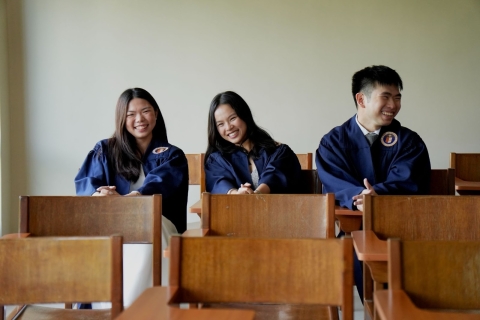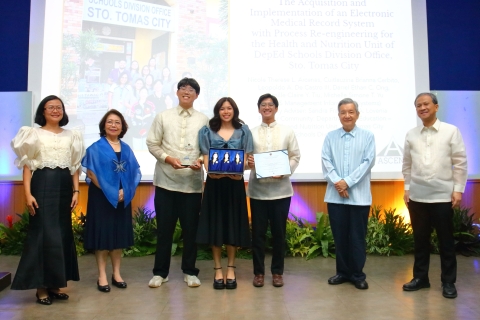Bridging theory and practice: Insights from the "Quants in the Wild" seminar
06 Oct 2024 | Kenrick So (M AMF)
The Ateneo Department of Mathematics recently held an insightful seminar as part of its Mathematics Research Series that shed light on the rapidly growing field of quantitative trading. Entitled "Quants in the Wild," guest speakers from industry leaders OpenDelta and Phitopolis were invited to offer students a glimpse into the complex and high-stakes world of algorithmic finance, where mathematical models and data-driven strategies drive investment decisions.
Quantitative finance or "quant finance" is a multidisciplinary field that combines mathematics, finance, and computer science. It has become essential as the financial industry increasingly relies on data and algorithms to predict and navigate market movements.
Edmond Yap, Head of Trading at OpenDelta, opened the session with a deep dive into the mechanics of quantitative trading. With more than 15 years of experience in high-frequency trading, Yap broke down the processes of developing, refining, and deploying algorithmic strategies in real-time financial markets. His extensive career, which includes key roles at top firms such as Jump Trading and Tower Research Capital, provided students with valuable insights into the diverse opportunities available to those interested in algorithmic finance. Rather than focusing solely on technical details, Yap emphasized the adaptability needed to succeed in an industry that is constantly evolving. He also highlighted the Philippines' growing role in the global financial technology ecosystem, positioning the country as an emerging hub for innovation and talent. This message resonated with many students, offering them a vision of how they can help shape the future of finance.
Building on Mr Yap's discussion, Pamela Anne Pasion, a quantitative researcher at Phitopolis, explored how emerging technologies such as natural language processing are changing the financial landscape. Pasion detailed how machine learning and big data are changing the way quants generate insights from unstructured data sources, such as news articles and social media feeds. Her presentation highlighted the growing importance of AI-driven analytics in maintaining a competitive edge in global markets, where timely and accurate interpretation of data is critical. Pasion's experience of working with teams across time zones and cultural backgrounds further illustrated the collaborative and interconnected nature of quantitative finance today. Her emphasis on the blend of human creativity and machine efficiency underscored how technological advances are reshaping the role of quants in financial markets.
Ateneo AMF alumna Engelica Perez also shared her journey from being a student in an applied mathematics course to becoming a fellow quantitative researcher at Phitopolis. Now a CFA Level 3 candidate, Perez reflected on how her strong foundation in mathematics equipped her to solve complex financial problems using statistical models and optimization techniques. Her story of transitioning from the classroom to the trading floor provided students with a tangible example of how academic training in mathematics can be directly applied to challenges in finance. Perez also emphasized the importance of developing skills in programming and data analysis, which are increasingly important for uncovering actionable insights in today's fast-moving markets. Her career path resonated with many students, providing a clear path from a university education to an impactful career in global finance.
Phitopolis, where both Pasion and Perez conduct their research, is part of a broader effort to foster technical talent in the Philippines' growing quantitative finance sector. By working closely with global hedge fund clients, firms like Phitopolis are creating pathways for local professionals to engage in cutting-edge research and innovation in algorithmic trading. The company's focus on a collaborative, learning-driven environment reflects the broader shift within the financial industry toward data-driven decision making. Together with companies like OpenDelta, these organizations are not only contributing to the global financial markets. They are also nurturing the local talent pool by offering students and young professionals in the Philippines a gateway to the international financial community.
The "Quants in the Wild" seminar concluded with an engaging open forum where students had the opportunity to explore various aspects of the speakers' careers and research. The discussions reinforced a key takeaway: that a solid foundation in mathematics, combined with curiosity and technical skills, can open up numerous opportunities in the rapidly evolving world of quantitative finance.
As the global financial sector continues its shift toward data-driven strategies, seminars like this serve as critical platforms for students to connect with industry professionals and gain insights into the field. They bridge the gap between theory and practice, providing a glimpse into the opportunities and challenges that lie ahead in quantitative trading. The seminar not only was an eye-opening experience that sparked both interest and ambition for a career in this fast-paced, high-stakes industry, it also reinforced the fact that having a strong academic background in mathematics could contribute to solving real-world problems.




